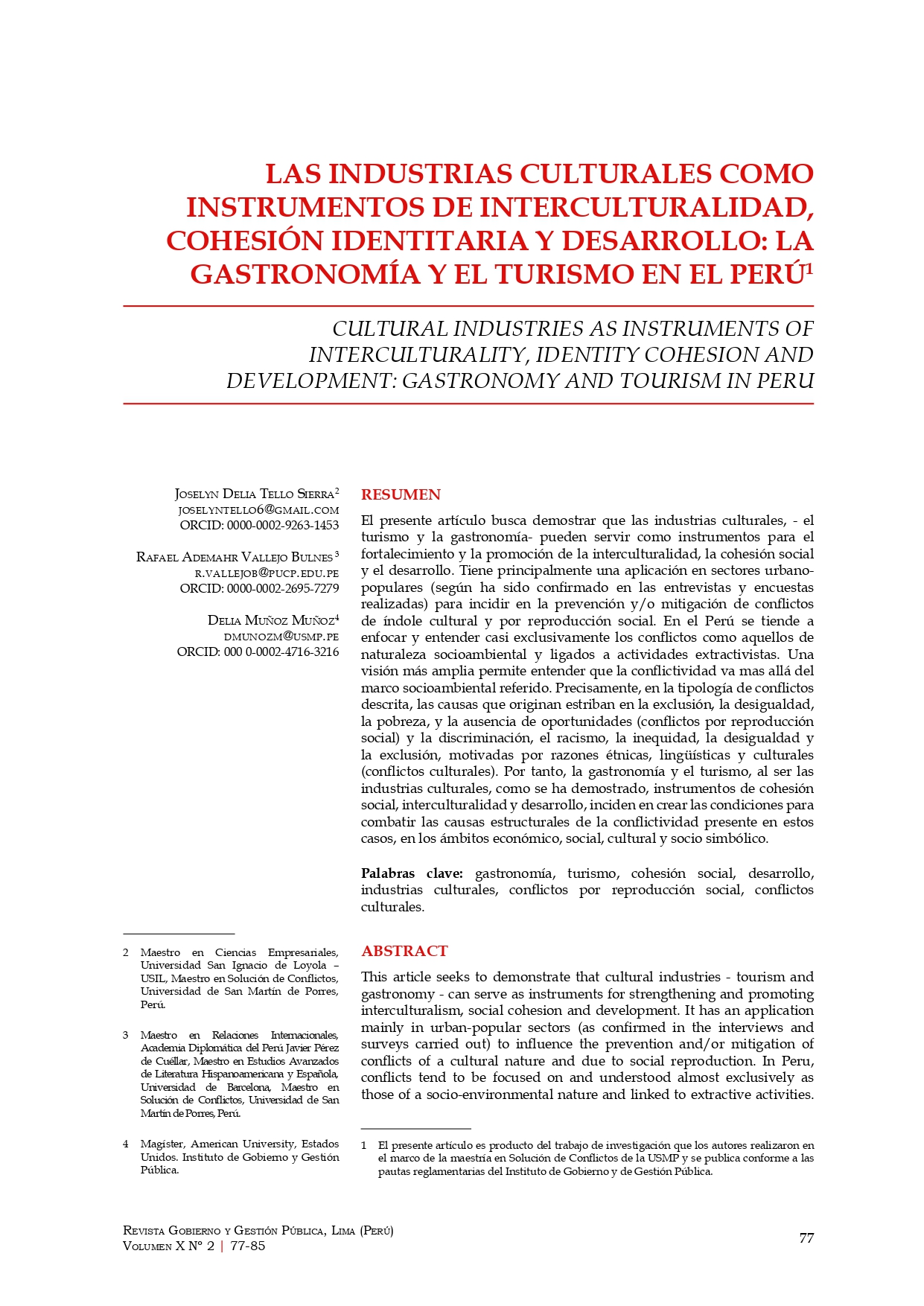CULTURAL INDUSTRIES AS INSTRUMENTS OF INTERCULTURALITY, IDENTITY COHESION AND DEVELOPMENT: GASTRONOMY AND TOURISM IN PERU
DOI:
https://doi.org/10.24265/iggp.2023.v10n2.07Keywords:
gastronomy, tourism, social cohesion, development, cultural industries, conflicts due to social reproduction, cultural conflictsAbstract
This article seeks to demonstrate that cultural industries - tourism and gastronomy - can serve as instruments for strengthening and promoting interculturalism, social cohesion and development. It has an application mainly in urban-popular sectors (as confirmed in the interviews and surveys carried out) to influence the prevention and/or mitigation of conflicts of a cultural nature and due to social reproduction. In Peru, conflicts tend to be focused on and understood almost exclusively as those of a socio-environmental nature and linked to extractive activities. A broader vision allows us to understand that the conflict goes beyond the referred socio-environmental framework. Precisely, in the typology of conflicts described the causes that originate are based on exclusion, inequality, poverty, and the absence of opportunities (conflicts due to social reproduction) and discrimination, racism, inequity, inequality and exclusion, motivated by ethnic, linguistic and cultural reasons (cultural conflicts). Therefore, gastronomy and tourism, being cultural industries, as has been shown, instruments of social cohesion, interculturality and development, have an impact on creating the conditions to combat the structural causes of the conflict present in these cases, in the areas economic, social, cultural and socio-symbolic.
Downloads
References
Bernales, Enrique & Ruiz, Antonio (2006). La pluralidad cultural en la constitución peruana de 1993 frente a las perspectivas de la reforma judicial y al derecho penal. Anuario de Derecho Penal. http://perso.unifr.ch/derechopenal/assets/files/anuario/an_2006_06.pdf
Centro de Recursos Interculturales (2018). Primera Encuesta Nacional Percepciones y Actitudes Sobre Diversidad Cultural y Discriminación Étnico-Racial, elaborada en el 2017. Ministerio de Cultura. https://centroderecursos.cultura.pe/es/registrobibliografico/i-encuesta-nacional-percepciones-y-actitudes-sobre diversidad-cultural-y
Corredor, Angélica (2019). La gastronomía peruana como impulsora estratégica del turismo. Universidad Santo Tomas. Repositorio institucional de la Universidad de Santo Tomás. https://repository.usta.edu.co/bitstream/handle/11634/18360/2019angelicacorredor.pdf?sequence=8&isAllowed=y
Dorival, Rosa (2018). Discriminación en el Perú: acercamiento bibliográfico. Fondo Editorial. https://repositorio.up.edu.pe/bitstream/handle/11354/2186/DI11.pdf?sequence=7&isAllowed=y
Fusté-Forné, Francesc (2016). Los paisajes de la cultura: la gastronomía y el patrimonio culinario. Dixit. http://www.scielo.edu.uy/scielo.php?script=sci_arttext&pid=S0797-36912016000100001
INEI (2017). Perú: Perfil sociodemográfico. Informe nacional. https://www.inei.gob.pe/media/MenuRecursivo/publicaciones_digitales/Est/Lib1539/
Kogan, Liuba. (2010). Desestabilizar el racismo: el silencio cognitivo y el caos semántico. Universidad del Pacífico. Centro de Investigación de la Universidad del Pacífico. https://alertacontraelracismo.pe/sites/default/files/archivos/investigacion/Liuba-Kogan-desestabilizar-el-racismo_0.pdf
Matta, Raúl (2014). República gastronómica y país de cocineros. Comida, política, medios y una nueva idea de nación para el Perú. Revista colombiana de antropología. http://www.scielo.org.co/scielo.php?script=sci_arttext&pid=S0486-65252014000200002
Mato, Daniel (2007). Todas las industrias son culturales: crítica de la idea de “industrias culturales” y nuevas posibilidades deinvestigación. Universidad de Guadalajara. http://www.scielo.org.mx/scielo.php?script=sci_arttext&pid=S0188-252X2007000200131
Ministerio de Cultura (2014). Derechos de los pueblos indígenas en el Perú. El rol garante del estado en la protección y promoción delos derechos humanos. Estación La Cultura. https://centroderecursos.cultura.pe/sites/default/files/rb/pdf/DerechosdelospueblosindigenasenelPeruMaterialesdecapacitacion2.pdf
PNUD (2013). Los conflictos sociales en América Latina. Fundación UNIR Bolivia. https://www.undp.org/es/bolivia/publications/los-conflictos-sociales-en-am%C3%A9rica-latina
Rey, Germán (2009). Industrias culturales, creatividad y desarrollo. Agencia Española de Cooperación para el Desarrollo. https://oibc.oei.es/uploads/attachments/64/2009_Ind_Cult_CreativyDes_AECID.pdf
Sen, Amartya (2000). Desarrollo y libertad. Editorial Planeta Argentina. https://www.palermo.edu/Archivos_content/2015/derecho/pobreza_multidimensional/bibliografia/Sesion1_doc1.pdf

Downloads
Published
Issue
Section
License
Copyright (c) 2023 Joselyn Delia Tello Sierra, Rafael Ademahr Vallejo Bulnes, Delia Muñoz Muñoz

This work is licensed under a Creative Commons Attribution-NonCommercial-ShareAlike 4.0 International License.














